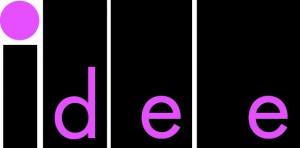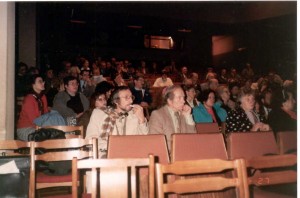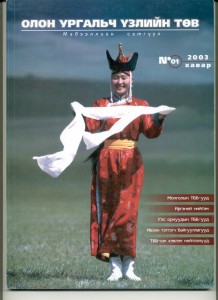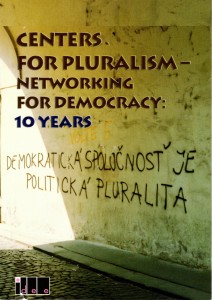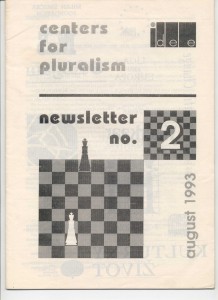
The 2nd issue of the Centers for Pluralism Newsletter (1993), providing useful information and contacts to civic organizations throughout the region.

Misha Berov (left) and Dimi Panitza (3rd from left) of the Free and Democratic Bulgaria Foundation, an early member of the Centers for Pluralism, with Eric Chenowth and Irena Lasota, in 1993.
Centers for Pluralism
The Centers for Pluralism (CfP) program was begun in 1992 by the Institute for Democracy in Eastern Europe to support the development of a regional network of pro-democratic non-governmental organizations attempting to rebuild civic life on the rubble of communism. Initiated in six Central and Eastern European countries, it expanded to more than twenty-five countries and regions. Centers for Pluralism was the first regional response — copied afterwards by several others — to address the common challenges being faced by democratic activists in all postcommunist countries. The CfP program brought together hundreds of civic and pro-democracy forces across the broadest geographic, national, ethnic, and religious borders in an effort to share experiences, build common programs, and foster a regional community dedicated to democratic values.
The Centers for Pluralism program identified key pro-democracy non-governmental organizations in post-communist countries that could serve as vehicles for helping develop other civic groups and networks within their own countries as well as for promoting contacts and working relationships with counterparts in other countries. In this way, Centers for Pluralism strengthened the foundation of civil society as well as built networks of democrats for the region. The educational premise was that it is easier to learn from each other and together; the political premise was that in times of transition to democracy, it is necessary to fill the social vacuum with authentic, honest civic organizations that can create the necessary environment for liberal democratic politics to emerge and function.
For ten years, until 2003, Centers for Pluralism and partner organization held regular full meetings organized by IDEE (at least once annually) as well as regional meetings in East-Central Europe, the Balkans, and the Caucasus to exchange information and experiences, develop common programs, and network to strengthen civil society in the region. As a result of these meetings, CfPs developed common programs addressing similar problems faced in postcommunist countries, such as decommunization, corruption, the weakness of political elites, lack of knowledge of ethical principles governing free media and democratic politics, the need for development of the NGO sector, teaching young political leaders in democratic theory and practice, fostering inter-ethnic tolerance, promoting independent and cross-border monitoring of elections, civic education and NGO skills training initiatives, among others.
In addition, IDEE organized a variety of initiatives to strengthen these efforts, including a small grants program that awarded more than 500 organizational and program grants within the CfP Network; a regional internship and exchange program involving more than 100 NGO and democratic activists gaining knowledge from more experienced CfPs; and, as part of its other regional programs, special internships, exchanges, and observation monitoring teams in which dozens of leaders of successful civic and political movements have gone to Azerbaijan, Belarus, Cuba, and other dictatorships and semi-authoritarian regimes. As a result of all these Centers for Pluralism initiatives, participating NGOs expanded their programs, capabilities, contacts, and funding, allowing them to reach a broader community of thousands of NGOs and activists throughout the region. The Centers for Pluralism themselves, as well as partner organizations, became strong, self-sustaining, and central members of their countries NGO communities, often taking leading roles in civic and democracy movements.
The Centers for Pluralism Newsletter (and its Azeri, Belarusan, Mongolian, Russian, and Ukrainian editions) broadened the reach of the CfP program to thousands of activists throughout the region and in all 30 post-communist countries. The English-language Newsletter (28 issues) published articles on civic and political developments in the region, discussions on controversial issues, useful information for NGOs, and the activities and contact information of more than 800 civic and political organizations. In addition, to fostering contacts among NGOs and democrats across borders, the Newsletter served as a key resource for Western donors and other organizations providing assistance in the region. An anniversary publication, Centers for Pluralism – Networking for Democracy, describes the achievements of the CfP Network in its first 10 years from the perspective of its members. It is downloadable in PDF format in full and in sections.
The Centers for Pluralism program was financed for ten years by the National Endowment for Democracy, until 2003 when it discontinued funding. Since then, IDEE and the Centers for Pluralism have not been able to continue most of the activities. IDEE has, however, continued to maintain this unique and vital network through a variety of different programs and initiatives. For one, the Centers for Pluralism have often involved other organizations in the network in their individual programs. As well, IDEE involved experienced democracy activists from more than twenty countries in a variety of innovative programs, including the Armenian Building Community Connections Program (2003-04), the Azerbaijan Presidential Election Monitoring Mission (2003), a Belarus Election Monitoring Project (2004), the final year of Civic Bridges in Serbia (2003), Civic Bridges–Central Asia (2003-05), Raising Consciousness for Belarus (2007-10), Democracy for Cuba (2005-11) , and a major election observation monitoring mission in Georgia in 2012, among others. Through its programs, IDEE has been able to draw upon the experience, skills, knowledge, and solidarity of more than 250 civic and democracy activists who have wished to help their colleagues in repressive conditions.
Most recently, IDEE gathered a number of members of the Centers for Pluralism network at its seminar “25 Years After 1989: Reflections on Unfinished Business” in Warsaw, Poland on October 3-5, 2014. Twenty-two veterans of the 1989-91 revolutions in Eastern Europe and the former Soviet Union were brought together to analyze what happened, the differing outcomes throughout the region, and the unfinished business that remains. Two publications, an IDEE Special Report and a special issue of Uncaptive Minds (IDEE’s journal published from 1988 to 1997) were recently issued and are available in digital form here. The Special Report, “25 Years After 1989: Reflections on Unfinished Revolutions,” provides the findings and recommendations of the participants and a summary of the seminar’s sessions. The special issue of Uncaptive Minds includes the edited proceedings of the seminar, including full papers, responses, and discussion among the participants.
For more information on the work of the Centers for Pluralism, see the 10th anniversary publication, “Centers for Pluralism: Ten Years of Networking for Democracy,” and also the Centers for Pluralism page on IDEE’s previous web site, www.idee.org, which hosts all digital web posts of IDEE from 1998-2014.
